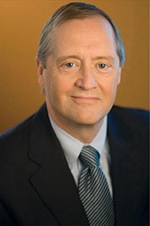 |
| Joseph Bolen |
Moderna Therapeutics' top scientist has quietly left the much-discussed company after two years at the helm of its R&D operation, walking away from a cash-flush biotech with big ambitions.
Joseph Bolen resigned from his positions as chief scientific officer and president of R&D this month, according to his LinkedIn profile, and Moderna has wiped any mention of him from the management page of its website. An archived version of the site listed his duty as overseeing "all aspects of R&D at Moderna, including discovery research, preclinical and clinical development, and clinical operations." Bolen came aboard in 2013 after a 14-year stint at Millennium Pharmaceuticals, where he last served as CSO as the company operated under Takeda's stewardship.
Bolen's surprise departure comes as the superlatively well-funded Moderna moves forward with more than 50 preclinical candidates, three venture-backed subsidiaries and a trio of high-dollar partnerships with larger drugmakers. Moderna confirmed his departure Tuesday, and CEO Stéphane Bancel said in an email to FierceBiotech that company president Dr. Stephen Hoge is now at the helm of the pipeline, with Chief Medical Officer Dr. Tal Zaks in charge of development.
"Stephen Hoge had been president of Moderna since January 2015," Bancel noted. "He has been at Moderna since January 2013. And he is quite amazing. His role is to oversee our entire mRNA platform. Science. Production. IP. Licensing in. Think about him as the leader of our mRNA OS. Tal is focusing on development."
The company burst onto the biotech scene in 2012, coming out of stealth with the radical promise of transforming patients' bodies into drug factories. Moderna's technology uses messenger RNA (mRNA) to spur the production of human proteins within patient cells, effectively creating an in vivo factory for targeted therapies, according to the company. Management believes its proprietary approach to mRNA has the potential to treat previously undruggable targets in a wide range of disease areas, and the promise of such an approach has helped the company raise about $1 billion in venture cash and collaboration dollars since its 2011 foundation.
But despite its big-money deals, Moderna has long been a subject of scrutiny in biotech circles, raising cash, recruiting partners and spinning out technologies but never actually advancing a single therapy into clinical trials. The sudden departure of its top scientist is unlikely to change the narrative.
Bolen was brought on to turn Moderna into "an R&D organization that is second to none," Bancel said in a 2013 statement, helping "to create a culture and a structure that can move rapidly to turn scientific innovation into therapies that make a true difference for patients."
Earlier this year, Moderna recruited Zaks, former head of cancer research at Sanofi ($SNY), to serve as chief medical officer. In January, Bancel said the company was in the process of recruiting about 100 new researchers to its staff of about 145, executing on partnerships with Merck ($MRK), AstraZeneca ($AZN) and Alexion Pharmaceuticals ($ALXN) while supporting subsidiaries focused on oncology, anti-infectives and rare diseases.